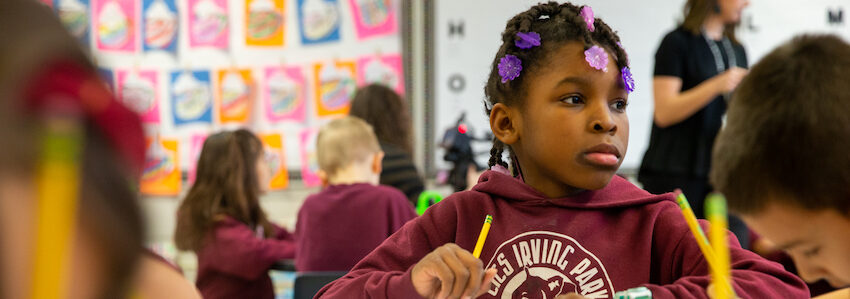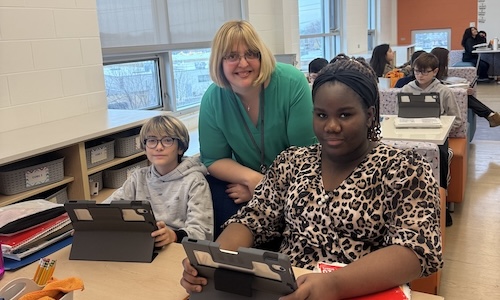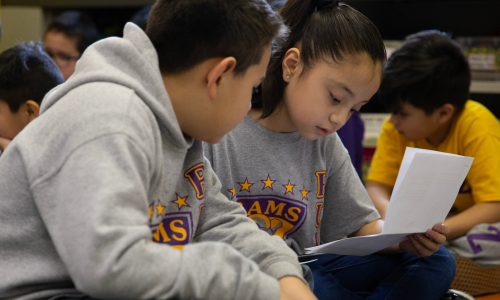
There is a buzz in education right now about literacy and the science of reading. Within these conversations there is a particular focus on early literacy and what research indicates are the best ways to teach children to read. According to the Education Commission of the States, nearly 40 states require interventions for students in grades K–3 who are reading below grade level, and just over 25 states have a policy either allowing or requiring retention at grade 3 for students not reading at grade level. Additionally, 45 states have policies about pre- or in-service literacy training for K–3 educators. Interestingly, there do not seem to be widespread similar policies or requirements for early numeracy.
A good deal of the discussion around math education is focused more on the other end of the system: pathways for success in college mathematics. The disparity in interest in early literacy and early numeracy can be illustrated via the simple and highly unscientific process of searching both terms online. On a recent day, the search term “early numeracy” produced 22,000,000 results, or about 1/20 of the 469,000,000 results produced by the search term “early literacy.” The term “math pathways” produced 540,000,000 results, far closer in magnitude to the “early literacy” results.
Make no mistake. My goal here is not to discourage interest in either early literacy or high school math pathways. Rather, I want to make a case for why early numeracy should generate the same level of interest as these other topics.
What’s the big deal?
There are many reasons to focus on early numeracy. A key one, and a possibly less well-known one, is the power of early math understanding to predict long-term student outcomes, and not just in math.
Several studies have found that early math skills are good predictors of later reading achievement. One meta-analysis of six longitudinal data sets found that skills like number knowledge and ordinality have twice the effect size—0.34 vs 0.17—in predicting later reading achievement than do measures of early reading skills. Another study found that kindergarten math skills may be predictors not only of later reading achievement but potentially of later social-emotional behaviors, including physical aggression and improved attention.
In terms of predicting future math achievement, a study conducted by researchers at the University of California, Carnegie Mellon University, and the University of Michigan found that pre-school math knowledge may predict math achievement through age 15. They also found that the growth made in math in kindergarten and first grade is even more predictive of later achievement. This finding and those from other studies suggest that early intervention in mathematics may be critical for improving students’ long-term achievement in math. Without targeted, purposeful intervention, the research seems to suggest that where a student starts in math sets the trajectory for where they wind up.
Ensuring the right focus
So, now that the importance of early math is clear, what concepts and skills should teachers focus on in the early grades? Thankfully, research can provide some direction here as well. Several studies point to the importance of supporting students’ number sense. A 2009 publication by the National Academies and a 2021 study both highlight three critical subdomains of early numeracy: number, number relations, and number operations.
- Number refers to students’ understanding of whole numbers, including counting, cardinality (understanding that the last number word said is the number of objects counted), subitizing (quickly determining the number of items in a set without counting), number recognition, and counting on and, eventually, counting by numbers other than one.
- Number relations, which includes understanding number magnitude, comparing and ordering numbers, and representing numbers on a number line.
- Number operations, which refers to composing and decomposing numbers. This lays the foundation for addition and subtraction.
In the book Mathematics Learning in Early Childhood: Paths Towards Excellence and Equity, the National Academies concludes that in addition to these early numeracy topics, the topics of geometry, spatial reasoning, and measurement are also important to focus on in early mathematics. These topics are highly connected to spatial reasoning, which research has shown supports performance in other mathematical domains. One study highlighted how development of spatial reasoning can support early numeracy by improving students’ understanding of number lines and number magnitude. Both Mathematics Learning in Early Childhood and What Works Clearinghouse’s Teaching Math to Young Children provide insight into the progressions of skills in early numeracy, geometry, spatial reasoning, and measurement as well as suggested activities and teaching approaches.
Building on what students know
Finding a curriculum that adequately supports the development of early numeracy is a key first step. It is also important to determine what knowledge students enter school with. Children have an innate number sense that develops before they ever enter a classroom. Given the wide variety of experiences students have before starting school, they will naturally enter with different levels of mathematical understanding. Assessing what students know upon school entry and exposing them to appropriately advanced content is critical.
The 2021 study discussed earlier suggests that for students who enter school with lower achievement in math, supporting development of number and number relations may be more impactful for future math achievement. For those who enter with more understanding of number, counting, and cardinality, focusing on number operations seems to support later high achievement. A 2013 study that found similar results also highlighted the mismatch between students’ ability and what is often taught in early math classes. The study found that kindergarten teachers spent the majority of their time in math on basic counting and shapes despite more than 95% of students showing mastery of these skills upon entry.
When assessing where students are in their understanding of math, it is important to consider biases that have resulted in historically marginalized children being denied rich, engaging, and challenging mathematics lessons and activities. In their book High Stakes: Testing for Tracking, Promotion, and Graduation, editors Jay Heubert and Robert Hauser argue that “minority students and low-SES [socioeconomic status] students are proportionately overrepresented in classes typically characterized by an exclusive focus on basic skills, low expectations, and less qualified teachers.” While students who enter with lower achievement may benefit from a stronger initial focus on number and number relations, these concepts should be taught rigorously and with high-quality materials and activities and with the goal of getting all students access to more challenging content. The knowledge students have upon entering school should be viewed as an asset upon which to build, not a deficit used to lower expectations and remove opportunities.
Developing a lifelong love of math
In a previous Teach. Learn. Grow. post, I spoke with Monica Rodríguez about math anxiety. Although there has been much talk about the prevalence of math anxiety, most of this has focused on students in later elementary school and beyond. Unfortunately, there is evidence that math anxiety can start early and that it can have a long-term impact on achievement.
In the short term, math anxiety can overload working memory and affect learning. Long-term, math anxiety may cause students to self-limit in terms of the types of math classes they take. NCTM’s position statement on mathematics in early childhood learning captures both the impact and opportunity that early math experiences hold for children: “Early childhood is an important and vulnerable time; these years lay the foundation for a child’s mathematical journey. High-quality early mathematics experiences have a long-lasting impact, serving as a catalyst for children’s later success in life. These beginning exposures to mathematics send powerful messages about who and what is valued.”
NCTM’s position statement and their joint position paper with NAEYC, “Early Childhood Mathematics: Promoting Good Beginnings,” both describe ways to support early numeracy and a love of mathematics right from the start. At the center is the need to provide equitable access to content, experiences, and settings that leverage children’s natural curiosity and innate number sense and that also celebrate and build upon their diverse backgrounds, languages, and experiences. Children come to us with experience using math in their everyday lives. Our job as teachers is to build upon this by providing children with interesting and appropriately challenging activities that further the connection between math and the world around them.
Looking for more?
Here are some great resources for more information on supporting young students as they develop early numeracy:
- Early childhood math videos: The Institute of Education Sciences/Regional Educational Laboratory Program has created videos focusing on developing both key early math skills and effective questioning strategies.
- Early literacy and early numeracy: Experts Cindy Jiban and Tammy Baumann discuss early literacy and early numeracy on NWEA’s The Continuing Educator podcast.
- Early Math Counts: This site created by the University of Illinois Chicago College of Education contains a wealth of resources including pre-school math lessons, access to free, online professional learning, and videos about teaching different math topics and creating a math-rich environment in your classroom.
- Early math resources: This site, developed by Stanford University’s Development and Research in Early Mathematics Education project, houses early math resources for families, teachers, and teacher educators.
- Education Week early math: This is a repository of all of Education Week’s current and past articles related to early mathematics.
- Todos: Mathematics for ALL: This site contains English and Spanish publications and resources for both families and educators designed to support equity and high-quality math education for all students.







